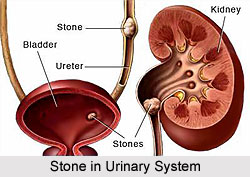 The symptoms of urinary diseases vary as there are basically two types of urinary disorders and among them one is the reason of bladder infections and another is kidney infections. The symptoms are more or less similar to each other.
The symptoms of urinary diseases vary as there are basically two types of urinary disorders and among them one is the reason of bladder infections and another is kidney infections. The symptoms are more or less similar to each other.
The common symptoms of bladder infection include frequent urination along with the feeling of having to urinate, Nocturia which is the need to urinate during the night, discomfort or pain at the urethral meatus or a burning sensation throughout the urethra with urination (dysuria) which is called Urethritis in the language of medical science, pain in the midline suprapubic region, Pyuria or pus in the urine or discharge from the urethra, Hematuria or presence of blood in urine, Pyrexia which is the occurrence of mild fever at times. The symptoms of bladder infections include pain and tenderness in lower back and above pubic bone. Sometimes the extreme fatigue, shaky, washed out feelings and feeling of pain even when not urinating is experienced.
Often women, too, feel an uncomfortable pressure above the pubic bone and some men experience fullness in the rectum. It is common for a person with a urinary infection to complain that, despite the urge to urinate; only a small amount of urine is passed. Even the sensation of not being able to hold urine and not being able to urinate easily or completely also felt during urination. The symptoms of urinary disorders also incorporate the discharge of cloudy and foul-smelling urine and sometimes presence of Protein in urine. Bladder infections occur less frequently in men than in women. The proximity of the female urethra to the vagina and anus, as well as the relatively short length of the female urethra contributes to this increased risk in women. Pregnancy is also a contributing factor to the development of bladder infections.
The symptoms of urinary disorder for kidney infections include Emesis that is the feeling of vomiting, back, side (flank) or groin pain, abdominal pain or pressure, sometimes shaking chills and high spiking fever, night sweats and extreme fatigue. These symptoms are added to the symptoms of bladder infections in case of kidney infections. In children, the symptoms of a urinary infection should be considered when a child or infant seems irritable, is not eating normally, has an unexplained fever that does not go away, has incontinence or loose bowels, or is not thriving. Certain changes in the urinary pattern of the children may be the symptom of urinary disorder that can happen to both the boys and the girls. In newborns the symptoms may be fever or hypothermia (low temperature), poor feeding, jaundice, for infants the symptoms may be vomiting, diarrhea, fever, poor feeding, not thriving and in elderly people the symptoms may be fever or hypothermia, poor appetite, lethargy, change in mental status.
In case of the symptoms of upper urinary tract infection which is called pyelonephritis in medical science include fairly high fever (higher than 101°F), shaking chills, nausea, vomiting and flank pain in back or side, usually on only one side at about waist level.
The symptoms of urinary disorders should be dealt with seriousness as the symptoms will lead to proper diagnosis and the proper diagnosis is needed for accurate treatment for the disease.




